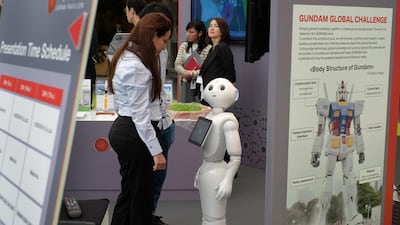Will robots take over your job? Although technology has long affected the labour force, recent advances in artificial intelligence and robotics are heightening concerns about automation replacing a growing number of occupations, including highly skilled or “knowledge-based” jobs.
Just a few examples: self-driving technology may eliminate the need for taxi, Uber and lorry drivers; algorithms are playing a growing role in journalism; robots are informing consumers as mall greeters, and medicine is adapting robotic surgery and artificial intelligence to detect cancer and heart conditions.
Of 700 occupations in the United States, 47 per cent are at “high risk” from automation, an Oxford University study concluded in 2013.
A McKinsey study released this year offered a similar view, saying “about half” of activities in the world’s workforce “could potentially be automated by adapting currently demonstrated technologies”.
Still, McKinsey researchers offered a caveat, saying that only about 5 per cent of jobs can be “fully automated.”
Another report, by PwC this month, concluded that about a third of jobs in the US, Germany and Britain could be eliminated by automation by the early 2030s, with the losses concentrated in transportation and storage, manufacturing, and wholesale and retail trade.
But experts warn that such studies may fail to grasp the full extent of the risks to the working population.
“The studies are underestimating the impact of technology – some 80 to 90 per cent of jobs will be eliminated in the next 10 to 15 years,” says Vivek Wadhwa, a tech entrepreneur and faculty member at Carnegie Mellon University in Silicon Valley.
“Artificial intelligence is moving a lot faster than anyone had expected,” says Mr Wadhwa, who is co-author of a forthcoming book on the topic. “Alexa [Amazon’s home hub] and Google Home are getting amazingly intelligent very fast. Microsoft and Google have demonstrated that AI can understand human speech better than humans can.”
Mr Wadhwa calls the driverless car a “metaphor” for the future of labour and a sign of a major shift.
Warnings of dire social consequences from automation have also come from the likes of the physicist Stephen Hawking and tech entrepreneur Elon Musk.
Historian Yuval Harari writes in his 2017 book Homo Deus: A Brief History of Tomorrow that technology will lead to “superfluous people” as “intelligent non-conscious algorithms” improve.
“As algorithms push humans out of the job market,” he writes, “wealth and power might become concentrated in the hands of the tiny elite that owns the all-powerful algorithms, creating unprecedented social and political inequality.”
Mr Harari points to the Oxford study, estimating a high probability of job loss to automation – cashiers (97 per cent), paralegals (94 per cent) and bakers (89 per cent) for example.
Others disagree. Boston University economist and researcher James Bessen dismisses alarmist predictions, contending that advances in technology generally lead to more jobs, even if the nature of work changes.
His research found that the proliferation of ATM machines did not decrease bank tellers’ employment in recent decades, and that automation of textile mills in the 19th century led to an increase in weaving jobs because it created more demand.
“Robots can replace humans in certain tasks but don’t entirely replace humans,” he says.
But he acknowledged that automation “is destroying a lot of low-skill, low wage jobs and the new jobs being created need higher skills.”
Former US president Barack Obama’s council of economic advisers also warned last year that most jobs paying less than $20 an hour “would come under pressure from automation”.
Although the net impact of robots remains unclear, tech leaders and others are already debating how to deal with the potential job displacement.
Microsoft founder Bill Gates said last month that he supports a “robot tax,” an idea floated in Europe, including by a socialist presidential candidate in France.
But Mr Bessen, a former fellow at Harvard’s Berkman Center, says taxing robots could be counterproductive.
“You don’t want to be taxing the machines because they enable people to earn higher wages,” he says. “If you tax machines, you will slow the beneficial side of the process.”
Peter Diamandis, chairman of the X Prize Foundation for technical innovation, is among those calling for a “universal basic income” to compensate people for job losses.
Offering income guarantees “will be one of many tools empowering self-actualisation at scale,” he said in a blog post, arguing that automation will allow people “to follow their passions, be more creative”.
* Agence France-Presse
business@thenational.ae
Follow The National's Business section on Twitter

